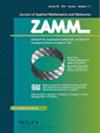应变梯度弹性与牵引边值问题的简化表达式
IF 3.2
4区 工程技术
Q1 MATHEMATICS, APPLIED
Zamm-zeitschrift Fur Angewandte Mathematik Und Mechanik
Pub Date : 2023-07-27
DOI:10.1002/zamm.202300329
引用次数: 0
摘要
本文章由计算机程序翻译,如有差异,请以英文原文为准。
Variant of strain gradient elasticity with simplified formulation of traction boundary value problems
In this paper, we show that within the class of isotropic Mindlin‐Toupin gradient theories there exist a particular variant of the theory, which allows a completely simplified form of traction boundary value problems. This theory can be obtained assuming that the high‐grade part of the strain energy density depends only on the vector‐type quantities, that are the gradient of dilatation and the curl of small rotation. Such incomplete gradient theory becomes positive semi‐definite and at the same time it obeys the strong ellipticity conditions of the general Mindlin‐Toupin first strain gradient elasticity. Based on the variational approach it is shown that the equilibrium equations of the developed theory and its definition for the surface traction can be given only in terms of the total stresses (like in classical elasticity). Such formulation can be useful for derivation of the closed form solutions for the problems with traction‐type boundary conditions. Examples of the solutions for the problem of cylindrical bending and for the inplane crack tip fields are presented. It is shown that considered theory allows to obtain a regularized solution for the crack problems and at the same time it does not predict a non‐physical infinite increase of the material's rigidity under bending.
求助全文
通过发布文献求助,成功后即可免费获取论文全文。
去求助
来源期刊
CiteScore
3.30
自引率
8.70%
发文量
199
审稿时长
3.0 months
期刊介绍:
ZAMM is one of the oldest journals in the field of applied mathematics and mechanics and is read by scientists all over the world. The aim and scope of ZAMM is the publication of new results and review articles and information on applied mathematics (mainly numerical mathematics and various applications of analysis, in particular numerical aspects of differential and integral equations), on the entire field of theoretical and applied mechanics (solid mechanics, fluid mechanics, thermodynamics). ZAMM is also open to essential contributions on mathematics in industrial applications.

 求助内容:
求助内容: 应助结果提醒方式:
应助结果提醒方式:


